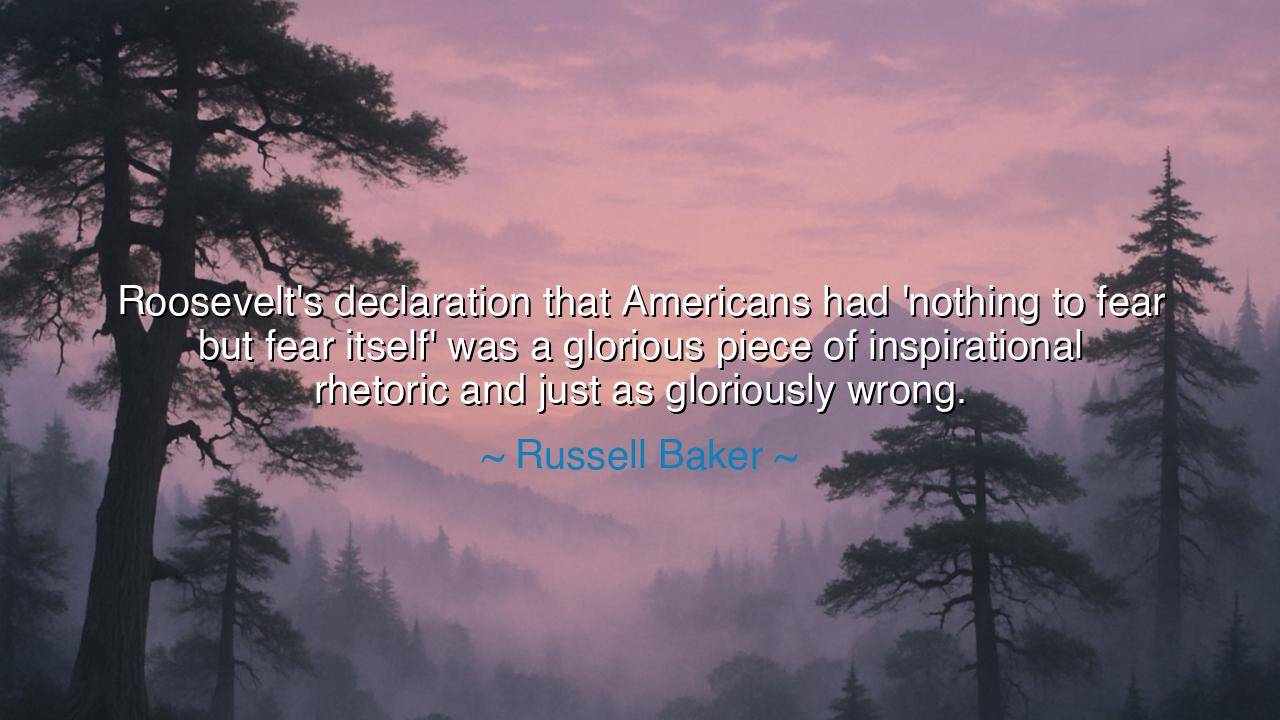
Roosevelt's declaration that Americans had 'nothing to fear but
Roosevelt's declaration that Americans had 'nothing to fear but fear itself' was a glorious piece of inspirational rhetoric and just as gloriously wrong.






In the words of Russell Baker, the wise and often ironic chronicler of American life, we encounter both admiration and warning in equal measure: “Roosevelt’s declaration that Americans had ‘nothing to fear but fear itself’ was a glorious piece of inspirational rhetoric — and just as gloriously wrong.” To read this is to stand at the crossroads between hope and realism, between the poetry of courage and the gravity of truth. For Baker, the line that stirred a generation’s heart was both a balm and a blindness — a necessary illusion for a broken people, yet an illusion nonetheless. His reflection invites us to ponder not only the power of words, but their limits.
When Franklin D. Roosevelt uttered those immortal words during his inaugural address in 1933, the world trembled in uncertainty. The Great Depression had laid waste to fortunes and faith alike. Banks collapsed, farms failed, and millions stood in breadlines, their eyes hollowed by despair. In such a moment, Roosevelt’s phrase — that radiant cry that “the only thing we have to fear is fear itself” — fell upon the American spirit like sunlight after storm. It was inspirational rhetoric, pure and perfect, giving voice to what the soul needed most: reassurance. Yet Baker, writing generations later, sees the phrase not as falsehood, but as noble deception — a flame that warmed the cold, even as it concealed the frost.
Baker calls it “gloriously wrong” because, though courage is essential, there are indeed many things in the world to fear — and to ignore them is folly. There are forces of destruction, greed, injustice, and ignorance that do not vanish through bravery alone. To face hardship requires not only faith, but wisdom — the clear-eyed understanding of reality. Fear, when mastered, is a teacher; but when dismissed entirely, it can become a blindfold. Thus, Baker honors Roosevelt’s words for their heroic spirit, even as he cautions that they were not absolute truth.
The ancients, too, wrestled with this paradox. The philosopher Seneca, writing to his friend Lucilius, warned that “we suffer more in imagination than in reality.” Like Roosevelt, he understood that fear magnifies danger, turning shadows into monsters. Yet even Seneca knew that to live without any fear at all is not courage, but arrogance. The wise, he said, do not banish fear — they govern it. In the same way, Baker reminds us that Roosevelt’s words, though magnificent, were incomplete. They gave hope to a weary nation, but they simplified the truth that fear, in its proper measure, preserves us as much as it limits us.
Indeed, fear is the twin of courage. The soldier, standing upon the battlefield, does not conquer fear by denying it, but by transforming it into resolve. The scientist, confronting the unknown, feels the tremor of doubt but turns it into curiosity. The leader, facing crisis, must acknowledge danger before daring to overcome it. Roosevelt’s phrase was a spell for the moment, a necessary incantation to rally hearts against despair. But Baker, the historian of human complexity, peels back the spell to reveal a deeper truth — that courage must walk hand in hand with awareness.
The tension between these two truths — the idealism of inspiration and the realism of wisdom — runs through all of history. After Roosevelt, America would face greater trials: war, injustice, division. Each demanded not just faith, but strategy, reflection, and humility. To say there is “nothing to fear” is to arm the spirit but disarm the mind. Baker’s observation, therefore, is not cynicism, but a call to maturity — to recognize that inspiration and intellect must work together, that noble words must be followed by noble deeds grounded in reality.
So, dear listener, what lesson shall we take from this dialogue between Roosevelt’s light and Baker’s shadow? It is this: let inspiration ignite you, but let truth guide you. When fear rises, do not surrender to it — but do not deny its warning, either. Let it sharpen your senses, deepen your wisdom, and strengthen your resolve. For in life, there will always be storms that courage alone cannot still — but courage, joined with understanding, can steer us through them.
Thus, we honor Roosevelt for his radiant faith, and Baker for his discerning mind. Together they teach us that words can lift us toward greatness, but only action, tempered by truth, can carry us there. Be inspired, but be awake. Dream greatly, but see clearly. For the world has many things to fear — yet none so dangerous as forgetting that fear, rightly faced, is not an enemy, but a guide on the road to wisdom.






AAdministratorAdministrator
Welcome, honored guests. Please leave a comment, we will respond soon